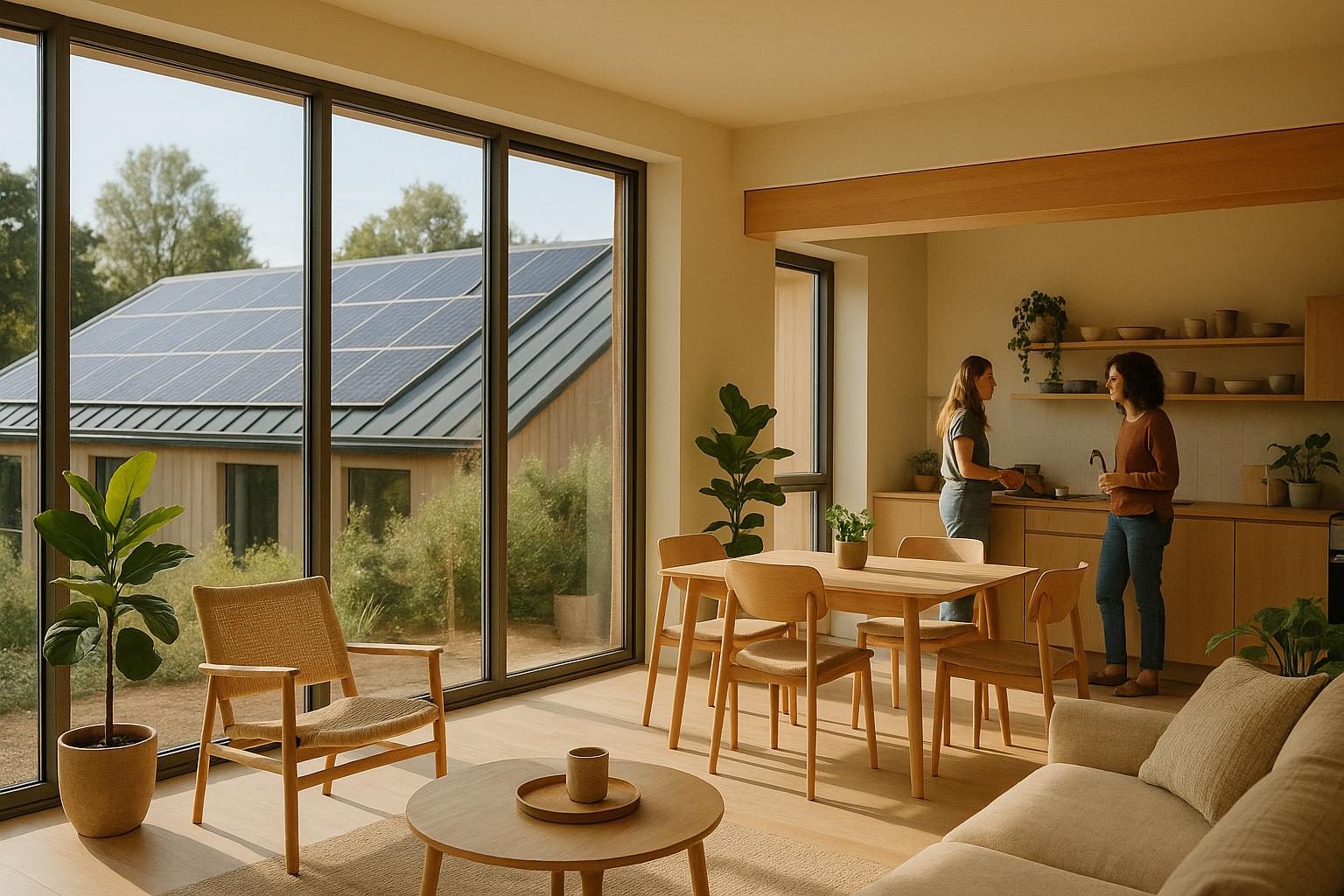Looking to move to a more affordable and opportunity-rich city? Emerging cities like Dallas, Denver, Austin, and Nashville offer a mix of lower living costs, growing job markets, and vibrant urban perks. Here's what you need to know:
- Cost Savings: Housing, utilities, transportation, and groceries are 10%-25% cheaper than national averages. A one-bedroom apartment costs $800-$1,500, compared to $2,500+ in places like San Francisco.
- Housing Options: Choose from private apartments, shared housing, or coliving spaces. Coliving is hassle-free, with bundled utilities, Wi-Fi, and community perks.
- Community Vibes: These cities are easier to settle into, thanks to local events, active social groups, and welcoming neighborhoods.
- Relocation Tips: Handle legal tasks early (like updating IDs and voter registration), set up utilities, and explore local healthcare and transportation options.
Emerging cities are a practical choice for families, remote workers, and young professionals aiming to save money without sacrificing urban conveniences. Ready to make the move? Start by researching cities that match your lifestyle and budget.
Cost of Living in Emerging Cities
Living in emerging cities often provides a financial balance that’s harder to achieve in major metropolitan areas. Let’s break down the key expenses that make these cities an attractive option for many Americans.
Main Cost Components
Here’s how the costs stack up in emerging cities, based on expense categories:
- Housing: Rent for a one-bedroom apartment typically ranges from $800 to $1,500 - far more affordable than in coastal hubs.
- Utilities: Monthly utility bills for a 915-square-foot apartment average between $150 and $250, which is lower than the national average of $207.36. Factors like newer infrastructure and milder climates contribute to these savings.
- Transportation: Public transit passes usually cost $40 to $80 per month, undercutting the national average of around $67. Many of these cities also feature walkable neighborhoods, making car-free living a real option.
- Groceries: A single person in an emerging city spends about $250 to $400 per month on groceries, compared to the national range of $300 to $500. Competitive local markets help keep prices down.
- Healthcare: Less crowded healthcare systems often result in lower premiums and medical costs.
Cost Comparison: Emerging Cities vs. Major Cities
The financial contrast between emerging cities and major metropolitan areas like Manhattan or San Francisco is stark. Manhattan’s cost of living is double the national average, and San Francisco’s is 91.4% higher. In comparison, emerging cities often sit 10% to 25% below national averages.
Housing is the most eye-opening difference. For instance, while a $2,000 apartment in an emerging city might cost $6,600 in San Francisco, this disparity allows residents in smaller markets to allocate more money toward savings, leisure, or other priorities.
The table below highlights the monthly savings potential across key expense categories:
| Expense Category | Emerging Cities (Monthly) | Major Cities (Monthly) | Savings Potential |
|---|---|---|---|
| Housing (1-bedroom) | $800 – $1,500 | $2,500 – $4,500 | $1,700 – $3,000 |
| Transportation | $100 – $200 | $200 – $400 | $100 – $200 |
| Utilities | $150 – $250 | $250 – $400 | $100 – $150 |
| Groceries | $250 – $400 | $400 – $600 | $150 – $200 |
| Dining Out | $200 – $350 | $400 – $700 | $200 – $350 |
| Entertainment | $150 – $300 | $300 – $500 | $150 – $200 |
Altogether, households in emerging cities can save between $2,400 and $4,100 per month compared to their counterparts in major cities, all while enjoying urban perks like job opportunities, dining options, and entertainment.
For context, the average U.S. household income after taxes in 2022 was $83,195, with annual spending of about $72,967. In emerging cities, this income stretches significantly further, offering a higher standard of living or more room for savings - especially for middle-income earners who might feel squeezed in pricier areas.
Jessie Handbury, an Assistant Professor of Real Estate at the Wharton School, offers an interesting perspective:
"When we say cheap versus expensive, I'm really thinking about how much happiness costs. So, for someone with gentrified tastes, a city that doesn't offer the products that they want to purchase, the cost of utility, the cost of happiness, for them is going to be higher in that location."
While these cities offer clear financial benefits, the value ultimately depends on individual priorities. As they grow and develop more vibrant dining, entertainment, and cultural options, emerging cities continue to narrow the lifestyle gap while maintaining their cost advantages.
Housing Options and Finding Accommodation
Choosing the right place to live plays a huge role in shaping your relocation experience. Understanding the variety of housing options available can help you make the most of the cost advantages in smaller, growing cities. These areas often provide more flexibility and choices compared to major metropolitan hubs, making it easier to find accommodations that align with your budget and lifestyle.
Types of Housing in Emerging Cities
- Private apartments: These offer independence but come with added expenses, such as utilities, internet, furniture, and maintenance.
- Shared housing: A middle-ground option where you rent a room in a shared unit. You’ll split common spaces with others and usually manage utilities and furnishings yourself. Most leases are fixed for 12 months.
- Coliving spaces: These are fully furnished setups with private bedrooms and shared communal areas. Utilities, Wi-Fi, and even cleaning services are bundled into one monthly payment, making them a convenient choice.
Why Coliving Makes Sense
Coliving offers an easy and cost-effective solution, especially for those moving long distances or starting fresh in a new city. For instance, in Los Angeles, coliving spaces near USC are 30-40% cheaper than one-bedroom apartments. Similarly, in Seattle, coliving near the University of Washington can save renters 25-35% compared to traditional leases.
The all-inclusive pricing eliminates the hassle of setting up utilities, purchasing furniture, or arranging internet services. This ease of transition is especially appealing to new professionals or anyone relocating to an unfamiliar city. Plus, coliving fosters a sense of community, helping you build social connections quickly.
"Coliving is emerging as a powerful solution, providing a warm and human-centred way of living for today's urban dwellers", says Nacho Rodríguez, CEO & Founder of Repeople.
Platforms like Coliving.com make finding these spaces simple, offering access to options in over 350 cities across 65+ countries. With prices starting as low as $100 per month, a fully online booking process, and flexible cancellation policies, securing a coliving space has never been easier.
Tips for Securing Housing
- Start Early: Begin your search 30-60 days before your move. If your plans aren’t set in stone, look for month-to-month rental options instead of committing to a year-long lease.
- Calculate Total Costs: Don’t just focus on base rent. Factor in utilities, internet, furnishings, and cleaning supplies - costs often bundled into coliving arrangements.
- Check Initial Fees: Traditional rentals often require first and last month’s rent plus a security deposit. Coliving spaces usually have lower upfront costs, making them more budget-friendly.
- Research the Area: Pay attention to proximity to essentials like grocery stores, public transportation, and your workplace - especially in less developed neighborhoods.
These tips can help you navigate housing options and find a setup that meets both your practical needs and your budget.
Local Life and Community Integration
Once you've settled into affordable and flexible housing, the next step is immersing yourself in the local culture and building meaningful connections. Emerging cities often blend tradition with fresh influences, creating vibrant environments where finding your place feels natural.
Adapting to Local Life
Every city has its own rhythm, and adjusting to it can make your transition smoother. Pay attention to how locals interact - whether they’re more reserved or outgoing, how they handle daily transactions, and which social norms are important. These small observations can help you navigate your new surroundings with ease.
Language skills play a big role, even in English-speaking areas. Picking up a few key phrases in the local language shows respect and helps foster warmer interactions with the community.
Local customs and cuisine offer a window into your city's character. Many emerging cities boast vibrant food scenes that mix traditional flavors with fresh influences. Visit food trucks, family-run eateries, or bustling community markets to enjoy authentic dishes and strike up conversations with locals. These spaces often serve as informal hubs for connection and cultural exchange.
Public transportation and daily routines are another way to get a feel for your new city. Hop on a bus, use bike-sharing systems, or explore via light rail to discover different neighborhoods. Observing how residents go about their day can provide valuable insights into local life.
The pace of life can vary greatly from larger metropolitan areas. Some cities may feel laid-back, prioritizing community and connection, while others might hum with entrepreneurial energy. Embracing these differences helps you better appreciate what makes your new home unique.
If you're living in a coliving space, you're already in a prime spot to integrate. These arrangements often bring together people navigating similar transitions, offering natural opportunities to learn about the local culture together.
Building Community Connections
After settling into your new routines, building relationships is the next step to feeling at home. Emerging cities are often known for their tight-knit communities and residents who are enthusiastic about shaping their city’s future.
Local events, festivals, and volunteer opportunities are great ways to meet people and feel more connected. Farmers markets, street fairs, art walks, and seasonal celebrations provide relaxed spaces for striking up conversations with neighbors. Volunteering with organizations like community gardens, animal shelters, or local nonprofits lets you contribute to causes you care about while meeting like-minded people.
Interest-based groups are another fantastic way to find your crowd. Platforms like Meetup, Eventbrite, and Facebook groups can help you discover book clubs, hiking groups, photography meetups, or professional networking events. Many emerging cities have active online communities where locals share tips, plan gatherings, and welcome new residents.
Community-focused housing options, like coliving spaces, also make it easier to form connections. Shared spaces and organized activities naturally bring people together, helping you bond with others going through similar experiences.
"Starting to feel at home as an expat and not as an outsider takes effort, curiosity, and a willingness to embrace differences. By actively engaging with the culture and community, you can forge a deeper connection and create a sense of belonging in your new home."
– Beste Cevik, Corporate Communications Intern at InterNations
Frequenting local spots - like a favorite coffee shop, gym, or market - can also help you become a familiar face in your neighborhood. Over time, casual interactions with staff and other regulars can turn into friendships.
Sharing your culture is another way to connect. Hosting potluck dinners, participating in cultural exchange events, or simply sharing your hobbies can enrich your experience while celebrating the diversity that many emerging cities embrace.
Creating these connections is the final piece of your relocation journey, turning a new city into a place that truly feels like home.
Practical Relocation Tips and Resources
Moving to a new city, especially one that's growing rapidly, involves juggling a lot of details. To make the process smoother, it's important to tackle both the legal tasks and the day-to-day essentials early on. Below, we’ll break down the steps to help you settle in with less hassle.
Legal and Administrative Requirements
Even in cities with simplified processes, updating your legal documents is a must. Start by organizing your paperwork as soon as you arrive. For instance, most states require you to update your driver's license and state ID within 30 to 90 days of becoming a resident. Check your state’s DMV website for specific deadlines and requirements. Typically, you’ll need a valid ID, proof of residency (like a utility bill or lease), and your Social Security number. Many states even let you begin the application online, saving you time.
Don’t forget to register your vehicle and update your auto insurance to meet your new state’s rules. Coverage requirements vary, and some states have income taxes while others don’t - resources like the Tax Foundation and Tax-Rates.org can help you navigate these changes.
Take time to familiarize yourself with local laws. Cities often have unique rules about things like pet ownership, parking, and recycling. Visit your city’s official website to stay informed and avoid unexpected fines.
Another key step is voter registration. This allows you to be part of local elections that shape your community. The U.S. Election Assistance Commission provides easy-to-follow guidance for registering in your new area.
If you’re moving with children, school enrollment should be a top priority. Research districts, gather documents like transcripts and immunization records, and note enrollment deadlines. Tools like the National Center for Education Statistics School Search can help you compare schools in your new area.
Setting Up Daily Life
Once your paperwork is in order, the next step is to establish the basics for daily living.
Banking
Look into local banks and credit unions. Many offer lower fees and better rates, but you’ll need identification and proof of address to open an account.
Healthcare
Find nearby hospitals, clinics, and pharmacies right away. Transfer your medical records and explore new health insurance options if needed. Knowing where to go for care ahead of time can save you stress later.
Transportation
Transportation options can vary widely depending on your new city. Some areas might have excellent public transit, while others are more car-dependent. Check bus routes, train schedules, and the availability of ride-sharing services. If you’re in a rural area, keep in mind that residents often travel farther for healthcare - about 17.8 miles on average compared to 8.1 miles in urban areas, with longer travel times as well.
"The greatest problems for people using public transportation for healthcare trips are inconvenient schedules, the need to match transit and medical schedules, and infrequent service." – 2010 study funded by the Federal Transit Administration (FTA)
Also, consider whether your new city is walkable or has bike-friendly infrastructure, as this can impact your daily routine.
Utilities
Make sure to set up utilities - electricity, gas, water, internet, and cable - before you move in. If you work remotely, schedule internet installation in advance to avoid interruptions.
Pre-Move and Post-Arrival Checklist
Staying organized can make your move much easier. Below is a checklist to help you stay on track, with tasks broken down by timeframe:
| Timeframe | Key Tasks | Priority Level |
|---|---|---|
| 8 Weeks Before | Research moving companies, set a budget, evaluate schools (if applicable), organize important documents | High |
| 6 Weeks Before | Book movers, gather packing supplies, start decluttering, learn about your new community | High |
| 4 Weeks Before | Purchase moving insurance, close out local memberships, collect medical and school records | Medium |
| 2 Weeks Before | Set up mail forwarding, notify service providers, transfer prescriptions | High |
| 1 Week Before | Confirm moving details, prepare cash for tips, clean your old home, check the weather forecast | Medium |
| Moving Day | Supervise movers, unpack essentials, introduce yourself to neighbors, stock up on groceries | High |
| First Week | Unpack priority items, explore the neighborhood, update bank accounts, register to vote | Medium |
| Two Weeks After | Finish unpacking, make spare keys, schedule maintenance, learn the trash pickup schedule | Low |
Budget for any unexpected costs like utility deposits or temporary housing if your new place isn’t ready right away. Also, keep both physical and digital copies of vital documents like birth certificates, Social Security cards, and insurance policies. This will make it easier to handle any unexpected situations.
Finally, take steps to prepare for emergencies. Save local emergency numbers in your phone, locate the nearest hospital, and learn about local emergency procedures. In some growing cities, emergency services may not be as readily available as in larger metropolitan areas.
Starting early and staying organized can make your move far less stressful, helping you settle into your new home and community with ease.
Conclusion
Key Takeaways
Relocating to an up-and-coming city can be a game-changer. It not only reduces living expenses but also opens the door to better career opportunities and a stronger sense of community.
Many of these cities are seeing rapid growth in industries like technology, healthcare, and finance. That means professionals in these fields might find more opportunities for career growth and advancement compared to larger, more competitive urban areas.
"Moving to a new city will open many new doors for you and will give you the chance to build the life you've always wanted for yourself." – Jessica Ryan, Moving Expert & Contributor
The timing couldn’t be better. In 2022, 12.6% of Americans made a move, with interstate migration staying robust. Remote work has played a big role in driving this trend. Migration data shows that the Sun Belt is a hot spot, with states like North Carolina, Tennessee, and South Carolina becoming increasingly popular.
"People are beginning to turn away from 'megacities' in favor of 'smaller, more breathable cities and towns with lower costs of living, easier access to the outdoors, and vibrant, self-contained cultural scenes.'" – Fernando Cervantes Jr.
With these trends in mind, you’re better equipped to plan a move that balances cost savings with a fulfilling lifestyle.
Next Steps
Now that you have the facts, it’s time to start planning your relocation. Begin by researching cities that match your career goals, lifestyle preferences, and budget. Look into job markets, living costs, community vibes, and local attractions. Regions like the Southeast and Southwest stand out for their booming job markets and affordable housing options.
Also, consider how shared housing arrangements can make your transition smoother. Platforms like Coliving.com offer flexible, all-inclusive housing plans starting at just $100 per month, including utilities. With over 105,000 members, the platform connects you with a network of remote workers, young professionals, and students, helping you settle into a new city with ease.
Their user-friendly filtering tools allow you to find housing that aligns with your lifestyle and budget. These fully furnished homes come with perks like Wi-Fi, cleaning services, and community events, taking the stress out of finding a new place.
Finally, don’t forget the practical details. Update your driver's license, register to vote, and handle banking adjustments. Once those are squared away, focus on everyday essentials like healthcare, transportation, and utilities to make your move as seamless as possible.
FAQs
What should I consider when deciding between private apartments, shared housing, and coliving spaces in emerging cities?
When deciding between private apartments, shared housing, and coliving spaces in growing cities, it’s essential to consider factors like cost, privacy, community, amenities, and flexibility to find the best fit for your needs.
Private apartments offer the highest level of privacy and independence, making them ideal for those who value their own space. However, they often come with a higher price tag, especially in central areas where demand is high. Shared housing, on the other hand, is typically more affordable and provides opportunities to connect with others. The trade-off? Less privacy and the need to navigate shared responsibilities like cleaning and household management.
Coliving spaces aim to bridge the gap between these two options. They provide fully furnished accommodations with perks like utilities, Wi-Fi, and cleaning services included in the rent. Plus, they come with a built-in sense of community and flexible lease terms, making them a popular choice for remote workers, students, and young professionals looking for convenience without sacrificing social connections.
Your decision will ultimately hinge on your budget, lifestyle preferences, and how much you prioritize privacy, convenience, or the chance to engage with others.
What career opportunities and industry growth can I expect in emerging cities compared to major metropolitan areas?
Emerging cities in the United States are stepping into the spotlight as hotspots for career opportunities and industry growth, sometimes even outpacing the nation’s major metropolitan areas. Sectors such as healthcare, technology, and social assistance are thriving in these cities, opening doors for professionals eager to advance their careers.
What makes these cities even more appealing is the combination of rising investments and a strong push for innovation, which are fueling dynamic local economies. On top of that, they often boast a lower cost of living compared to larger urban centers, making them an ideal choice for those looking to balance career advancement with a more manageable lifestyle.
How can I meet people and build a sense of community when moving to a new city?
Building Social Connections in a New City
Moving to a new city can feel overwhelming, especially when it comes to meeting people and building relationships. But there are plenty of ways to make the process smoother and even enjoyable.
A great place to start is by joining local groups or clubs that align with your interests. Whether it’s a sports league, a book club, or a crafting meetup, these gatherings are perfect for connecting with others who share your passions. Community events like festivals, farmers' markets, or workshops also offer opportunities to strike up conversations while getting to know your new surroundings.
Volunteering is another fantastic way to meet people while making a positive impact in your community. It’s a win-win: you’ll contribute to a cause you care about and meet others who value the same things. Don’t forget to check online platforms and social media for local events or interest-based groups - these can be goldmines for finding like-minded individuals.
By staying open to new experiences and taking the initiative, you’ll soon find yourself forming meaningful connections and feeling more at home in your new city.






